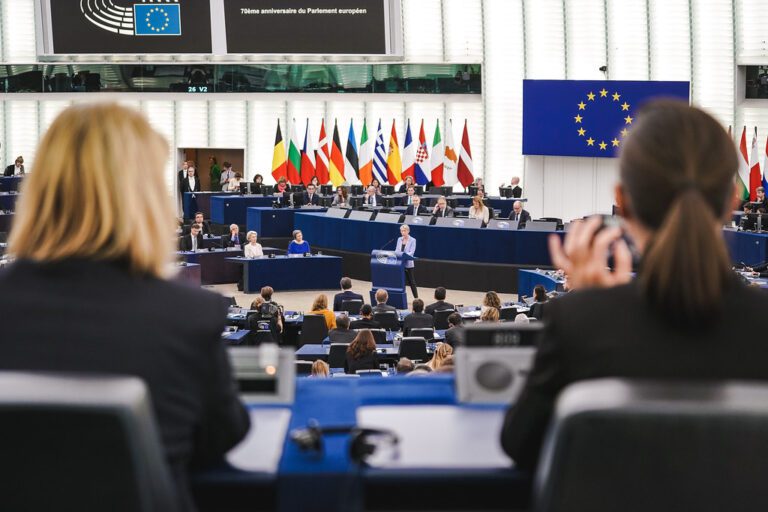
Central Europe is home to a small Chinese community that rarely makes headlines. However, during the COVID-19 pandemic, diaspora activities in the region stand at the forefront of China’s “mask diplomacy”.
Prepared in Advance
Chinese communities in Central Europe have formed only recently, after the countries in the region opened their borders in the 1990s. The exact size of local communities is unknown, but according to rough estimates the largest community resides in Hungary, numbering 20 thousand, while communities of below 10 thousand live in Czechia and Poland. The smallest community of around three thousand Chinese expatriates live in Slovakia. Most of the Chinese immigrants in the region come from Zhejiang province, especially from the city of Wenzhou and Qingtian county, and also from Fujian province.
During the COVID-19 pandemic, the Chinese communities abroad seem to have been among the first to perceive the severity of the situation. Closely following the developments in China, with many local Chinese returning from spending Chinese New Year holidays there, Chinese communities abroad prepared themselves for the pandemic reaching also their “second homes”. One case that caught the attention of international media was the 50 thousand-strong community of Chinese in the Italian town of Prato that initially faced discrimination due to association with the spread of the virus, but was eventually praised by authorities as an example of early and comprehensive adoption of anti-epidemic measures. As a result, there were allegedly zero infections among the community according to local health authorities.
Similar phenomena could be observed in Central Europe. For example, in Slovakia, the local Chinese community established an anti-epidemic working group. The group assisted the local Chinese community by establishing communication channels to spread relevant information and also to assist in implementing preventive measures. Local community provided services such as airport pick-up for returned compatriots, as most returnees arriving at neighboring Vienna or Budapest airport and not Bratislava, using multiple cars. This allowed the returnee to drive in a separate car. The community even prepared separate, designated apartments for self-quarantine of the returnees.
Hunt for Medical Supplies
The local Chinese communities were also primary actors organizing collections of medical supplies to be sent to China. On January 25, 2020, the All-China Federation of Returned Overseas Chinese, a nominally independent association under the United Front system, designed to co-opt non-CCP forces, including Chinese diaspora, issued a call for donations of funds and medical equipment to Chinese abroad to assist in the fight against the epidemic. This call was also circulated by the provincial federations. It seems it was this call that led to an organized hunt for medical supplies by local Chinese communities around the world, including Central Europe. However, no records are available on the Chinese diaspora purchasing supplies already in mid-January, while Beijing was hiding the severity of the virus, as some U.S. intelligence reports claimed. Moreover, the purchases were not made secret and were instead widely publicized in Chinese media.
As was widely reported in Czech media, the local community in Czechia, led by the Qingtian Hometown Association and Czech Chinese Youth Association, organized the delivery of some 800 thousand face masks and other equipment to China. It was later revealed that Czechia’s security service warned the government about the ongoing mass purchases, pointing at the efforts being organized by the Chinese Embassy. In Poland, the Zhejiang Chamber of Commerce coordinated a donation of various diaspora organizations and individuals of almost one million face masks to China by the end of February. Similar efforts were undertaken in Hungary and Slovakia at the time. In most of the cases, local communities donated supplies to the provincial Federations of Returned Overseas Chinese in China, which then further distributed them. Apart from the donation of material, various financial contributions were also organized.
Apart from the genuine concern about the situation in China, this also created an opportunity for local diaspora leaders to prove their leadership and improve their image among the local community but also in China. Articles written by the local organizations themselves, later reprinted in Chinese media, praised the heroic efforts of the diaspora leaders. For example, the head of the Czech Chinese Youth Association Zong Weiyong was titled “Prague’s Lei Feng” (a lionized do-good soldier of the Mao-era propaganda) for his efforts in the community. As was to be expected, diaspora leaders also took top billing in the published lists of financial donations.
Aid Changes Direction
While the pandemic situation has stabilized and slowly improved in China, Europe has become the new epicenter of the epidemic, with the first cases of COVID-19 appearing in Central Europe in March. As such, the flow of aid reversed course, with the local Chinese diaspora playing an important role again.
In Czechia, a “league of volunteers” was formed by local Chinese, distributing masks to “high risk service workers“. Community organizations also donated supplies to the city of Třebíč (which previously organized a donation for China), medical institutions and schools. According to Chinese embassy in Slovakia, the local Chinese community donated some 400 thousand masks. The Union of Young Chinese Entrepreneurs even became the second biggest donor in a state-run relief fund. In Hungary, among others, Wenzhou Chinese and Fuqing Chinese associations donated supplies to district governments in Budapest.
It is unclear to what extent these donations were directed centrally by Beijing as it seems ‘mask diplomacy’ has turned into a chaotic, largely autonomous effort that Beijing has struggled to take control over. Yet, in some cases, the donations were first received by diaspora organizations from China and only then distributed locally. Chinese embassies have commended the actions of the local diaspora, holding them up as a positive force in improving bilateral ties. In Slovakia, the Embassy official stressed that the Chinese community should be a “hardworking gardener caring for the tall tree of China-Slovakia friendship”.
The Motherland Cares for Its Children
A largely ignored aspect of mask diplomacy around the world has been the assistance to local Chinese communities and also Chinese students. The Chinese government has faced criticism for discouraging the return of Chinese nationals living abroad and students during the pandemic, e.g. by limiting the number of international flights. Calls for local Chinese not to travel back to China were also issued by Chinese embassies, such as in Poland. Thus, material aid and assistance were organized to stress that the “motherland” did not forget Chinese abroad.
Medical supplies, including traditional Chinese medicine, were sent from the compatriot associations in China as well as donated by local Chinese companies. For example, in Czechia, supplies for local Chinese were sent from the Beijing Returned Overseas Chinese Federation, Beijing Chinese Overseas Friendship Association and the Qingtian county. In Poland, local branches of Huawei, Bank of China, Industrial and Commercial Bank of China (ICBC) and other companies donated supplies, made into “health packages” distributed to Chinese students. Such health packages were distributed by Chinese embassies all around the world, Local embassies also organized video conferences with Chinese students. State media in China widely reported on the emotional response of the students to the donations and consular help, promoting the idea that Beijing cares for the safety of nationals left abroad.
The network of compatriot associations was used to distribute the supplies, just as when the supplies were being sent the other way a mere month prior. Diaspora associations have also been used as intermediaries for distributing supplies to third countries.
However, these efforts were not without controversy. In March, Czech police confiscated a shipment of masks from a warehouse, saying that they belonged to a speculator that wanted to sell them to the Czech government for an exorbitant price. It was later revealed that part of the shipment was humanitarian aid from Qingtian destined for Chinese compatriots in Italy. The whole shipment was originally imported by the head of the local Qingtian Association, Zhou Lingjian, a powerful United Front figure who claimed that he had sold part of the masks to the local company for a normal price and the rest of the masks were to continue to Italy as a donation. To this point, it is not clear why Zhou Lingjian would transfer the donated masks through Czechia, nor is it clear why the rest of the masks remained in his storehouse together with the donation.
Interestingly, there were reports from the local Chinese community in Czechia that Zhou Lingjian misused the distribution of masks in the Chinese community. For example, Zhou allegedly required those seeking to acquire free masks to become members of the Qingtian Association, which requires paying a membership fee. Zhou was also accused of taking advantage of the diaspora newspaper he controls, The Prague Chinese Times, to spread the incomplete story of “Czechia confiscating Chinese donations” to the audience in China. The episode, first reported by the paper, created virulent reactions on the Chinese internet.
United Front Reaches Central Europe?
Overall, the extent of mobilization of the Chinese diaspora has been unprecedented throughout the epidemic. Local Chinese diaspora associations have coordinated the efforts with embassies as well as United Front organizations in China and other diaspora organizations across Europe. Naturally, there is nothing wrong or unexpected about Chinese diaspora wanting to help their compatriots at home. Chinese diaspora has long been notable for its concerted efforts in sending assistance to China in times of need. One of the most notable efforts in this respect was the assistance sent after the disastrous Wenchuan earthquake in 2008. In the same vein, charitable activities of local communities should not be immediately labeled as Beijing-controlled influence operations.
Yet, this time it seems to follow on the heels of a heightened effort from Beijing to exert control over Chinese diaspora all over the world. It is now commonly accepted that the United Front work directed at overseas Chinese populations has been rising in importance under Xi Jinping. China, more specifically, the Chinese Communist Party, wants to ensure the loyalty of all Chinese around the world, regardless of borders or even citizenship. The main instrument in this is the control of local diaspora organizations, the heads of which often hold positions in United Front bodies in China or are regularly invited for United Front activities.
China misusing diaspora for political purposes is not new, even in the region. To say the least, local Chinese seem to have been getting increasingly politically active. In both Slovakia and Czechia, meeting parties for visiting Chinese president Hu Jintao and Xi Jinping were organized in 2009 and 2016 respectively, resulting in clashes with local protesters in both cases. Diaspora associations, chief among them the local chapters of China Council for the Promotion of Peaceful National Reunification, established in all four countries after 2000, have regularly published statements supporting the Chinese government’s stance on issues such as Taiwan, Xinjiang, and the Hong Kong protests. Regarding the latter, local Chinese even organized public demonstrations expressing opposition to Hong Kong’s anti-extradition movement in Hungary and Poland.
Without field research, it is impossible to ascertain how much the diaspora life in Central Europe countries is politicized, nor is it possible to measure concretely the extent to which the specific diaspora organizations control or influence Chinese communities in the region. Previous research from the early 2000s in Czechia, for example, claimed that the Chinese diaspora was heterogeneous, without a sense of community, noting the low participation in diaspora organizations and even instances of resisting politicization of diaspora life. Yet looking at the recent activities of diaspora associations, this seems to have changed. Beijing’s assistance to local communities may tangentially serve as a tool to further exert control over diaspora life going forward.
In light of these trends, governments in the region should improve their outreach towards the local Chinese communities, especially in light of the worrying racist incidents regarding the association of ethnic Chinese with COVID-19. Facing discrimination, Beijing’s effort to exert control over the communities may only be encouraged.
Written by
Filip Šebok
Filip Šebok is an analyst at CEIAS. He was a China Research Fellow and Project Manager at the Association for International Affairs (AMO) in Prague, Czech Republic.


